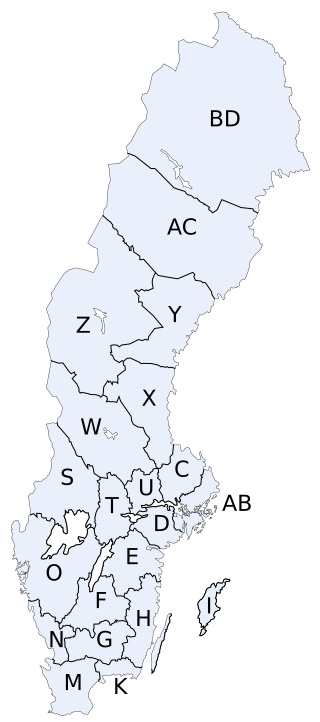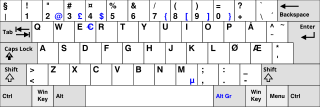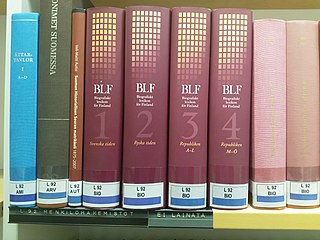
Old Norse, also referred to as Old Nordic, or Old Scandinavian was a stage of development of North Germanic dialects before their final divergence into separate Nordic languages. Old Norse was spoken by inhabitants of Scandinavia and their overseas settlements and chronologically coincides with the Viking Age, the Christianization of Scandinavia, and the consolidation of Scandinavian kingdoms from about the 8th to the 15th centuries.

Swedish is a North Germanic language from the Indo-European language family, spoken predominantly in Sweden and in parts of Finland. It has at least 10 million native speakers, the fourth most spoken Germanic language and the first among any other of its type in the Nordic countries overall.

Scandinavia is a subregion of Northern Europe, with strong historical, cultural, and linguistic ties between its constituent peoples. Scandinavia most commonly refers to Denmark, Norway, and Sweden. It can sometimes also refer to the Scandinavian Peninsula. In English usage, Scandinavia is sometimes used as a synonym for Nordic countries. Iceland and the Faroe Islands are sometimes included in Scandinavia for their ethnolinguistic relations with Sweden, Norway and Denmark. While Finland differs from other Nordic countries in this respect, some authors call it Scandinavian due to its economic and cultural similarities.

Län, lääni and len refer to the administrative divisions used in Sweden and previously in Finland and Norway. The provinces of Finland were abolished on January 1, 2010. In Norway, the term was in use between 1308 and 1662.
Onela was, according to Beowulf, a Swedish king, the son of Ongentheow and the brother of Ohthere. He usurped the Swedish throne, but was killed by his nephew Eadgils, who won by hiring foreign assistance.
An alpha privative or, rarely, privative a is the prefix a- or an- that is used in Indo-European languages such as Sanskrit and Greek and in words borrowed therefrom to express negation or absence, for example the English words of Greek origin atypical, anesthetic, and analgesic.

Pite Sámi or Arjeplog Sámi is a Sámi language traditionally spoken in Sweden and used to be spoken in Norway. It is a critically endangered language that has only about 25–50 native speakers left and is now only spoken on the Swedish side of the border along the Pite River in the north of Arjeplog and Arvidsjaur and in the mountainous areas of the Arjeplog municipality.
Kapingamarangi is a Polynesian language spoken in the Federated States of Micronesia. It had 3,000 native speakers in 1995. The language is closely related to the Nukuoro language.
Wik-Mungkan, or Wik-Mungknh, is a Paman language spoken on the northern part of Cape York Peninsula of Queensland, Australia, by around 1,000 Wik-Mungkan people, and related peoples including the Wikalkan, Wik-Ngathana, Wikngenchera language groups. Wik Mungkan is healthier than most other languages on the peninsula, and is developing and absorbing other Aboriginal languages very quickly.

Norwegian and Swedish Travellers, commonly known as Romanisael, are a group or branch of the Romani people who have been resident in Norway and Sweden for some 500 years. The estimated number of Romanisael in Sweden is 65,000, while in Norway, the number is probably about 10,000.
Scandoromani is a North Germanic based Para-Romani language. It is spoken by the Scandinavian Romanisæl Travellers, a Romani minority community, in Norway, and formerly in Sweden.

Many languages are spoken, written and signed in Norway.

The Skåäng Runestone, designated as Sö 32 under Rundata, is an Iron Age runestone located in Skåäng, Södermanland, Sweden, which is inscribed in Proto-Norse with the elder futhark. During the Viking Age, a second runic inscription was added in Old Norse using the younger futhark.

Finnish is a Finnic language of the Uralic language family, spoken by the majority of the population in Finland and by ethnic Finns outside of Finland. Finnish is one of the two official languages of Finland, alongside Swedish. In Sweden, both Finnish and Meänkieli are official minority languages. Kven, which like Meänkieli is mutually intelligible with Finnish, is spoken in the Norwegian counties of Troms and Finnmark by a minority of Finnish descent.

An ombudsman, ombud, ombuds, bud, ombudswoman, ombudsperson, or public advocate is a government employee who investigates and tries to resolve complaints, usually through recommendations or mediation. They are usually appointed by the government or by parliament.

The Swedish Sign Language family is a language family of sign languages, including Swedish Sign Language, Portuguese Sign Language, Cape Verdian Sign Language, Finnish Sign Language and Eritrean Sign.
In the contemporary English language, the noun Polack is a derogatory term, mainly North American, reference to a person of Polish origin. It is an anglicisation of the Polish masculine noun Polak, which denotes a person of Polish ethnicity and typically male gender. However, the English loanword is considered an ethnic slur.

The Biografiskt lexikon för Finland is a Finnish Swedish-language biographical dictionary that was published between 2008–2011.











